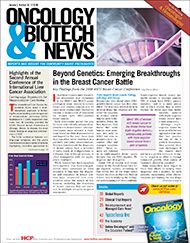Publication
Article
OBTN
Flash Findings: Cancer Facts
Author(s):
A collection of cancer statistics and facts
Click here to view as PDF.
â–º Mortality
• This year, 559,650 Americans are projected to die of cancer, perishing at a daily rate of approximately 1,500.
Source: American Cancer Society
• Cancer is considered to be the second-largest reason for death in the U.S. after heart disease, with roughly one in
every four deaths linked to some form of cancer.
Source: American Cancer Society
• About seven million people die of cancer each year worldwide. If current trends continue, by 2020 more than 10
million people could die from the disease.
Source: International Union Against Cancer
• The developing world will bear the brunt of increased cancer fatality rates. By 2020, three quarters of cancer deaths
will occur in the developing world.
Source: International Union Against Cancer
â–º Incidence
• The annual incidence of cancer is expected to increase about 50% to 15 million cases annually by 2020.
Source: World Health Organization
â–º Breast Cancer
• An estimated 178,500 new cases of invasive breast cancer are expected to occur among women in the U.S. in 2007.
in situ
• Roughly 62,000 cases of non-invasive () breast cancer are expected to occur among women in 2007.
• After decades of annual increases, breast cancer incidence has leveled off over the past several years.
• Breast cancer is the most frequently diagnosed cancer in women.
• Roughly 2,030 cases of new male breast cancer are expected in 2007.
Source: American Cancer Society
â–º Cancer Costs
• In 2006, the overall costs of cancer were $206.3 billion.
• Direct medical cancer costs (total health expenditures) exceeded $78.2 billion.
Source: National Institutes of Health (NIH)
• Cancer Costs $17.9 billion in indirect morbidity (costs of lost productivity due to illness) and $110.2 billion in indirect
mortality (costs of lost productivity due to premature death).
Source: American Cancer Society
â–º Smoking and Cancer
• Smoking is the main cause of cancer in the world and the main cause of death in adult life.
• Annually, about one million people in the United States take up smoking. Worldwide, roughly 30 million people
begin smoking each year.
Source: Deathfromsmoking.net
•
All cancers caused by cigarette smoking could be prevented completely. • It is estimated that in 2007, 168,000
cancer fatalities are expected to be caused by smoking.
Source: American Cancer Society
Smoking and Cancer
Chances of lung cancer in men who stop smoking at age 50
6%
Chances of lung cancer in men who continue to smoke past age 50
16%
Chances of cancer of the pharynx, esophagus, and larynx in men who stop smoking at age 50
3%
Chances of cancer of the pharynx, esophagus, and larynx in men who continue to smoke past age 50
6.4%
Sources: British Medical Journal and the American Journal of Epidemiology
â–º Cancer and Minorities
•
The death rate from cancer among African-American males is 38% higher than the death rate of Caucasians.
• The death rate from cancer among African-American females is 17% higher than the death rate of Caucasians.
Source: American Cancer Society
â–º Oncology Marketplace
•
Over the next several years, the global cancer market is predicted to grow at a compound annual growth rate (CAGR)
exceeding 10%.
Source: Datamonitor
•
The global market for cancer innovatives has more than tripled in size over the last four years, achieving a CAGR of
33.1% between 2003 and 2006.
• Monoclonal antibodies comprised four of the top ten leading cancer innovatives in 2006, supplemented by novel
chemotherapeutics, hormonals, and targeted therapies.
• According to experts, 10 blockbuster drugs are likely to emerge in cancer therapy over the next decade as recent and
impending scientific breakthroughs continue to enhance treatment options
• Genentech and Roche continue to command a substantial proportion of the cancer innovatives market, generating
almost 50% of all sales in 2006.
Source: Globalbusinessinsights.com
â–º Prostate Cancer
•
One in six men will get prostate cancer during his lifetime, but only one in 34 will die of the disease.
Source: American Cancer Society
â–º Testicular Cancer
•
There are nearly 140,000 men in the United States who have survived testicular cancer.
• There will be roughly 7,920 new cases in the United States and 380 deaths from the disease in 2007.
Source: American Cancer Society
â–º BioFact
•
In 1882, German biologist Walter Fleming discovered chromatin; rod-like structures inside the cell nucleus that later
came to be called chromosomes.
